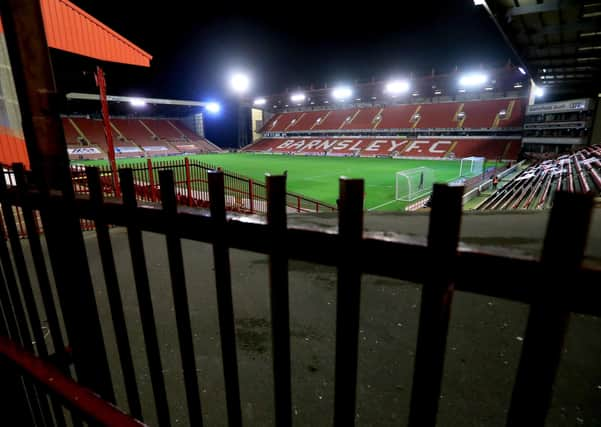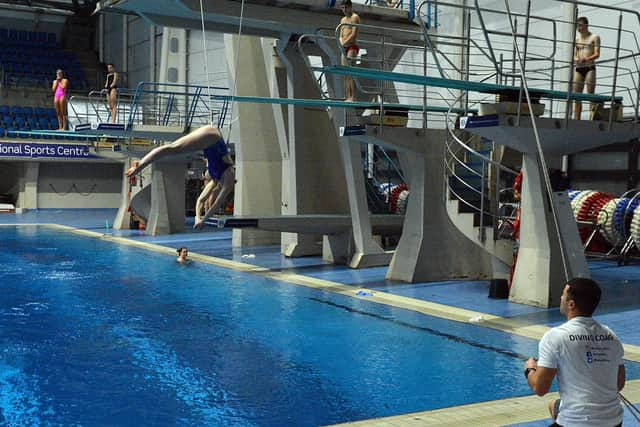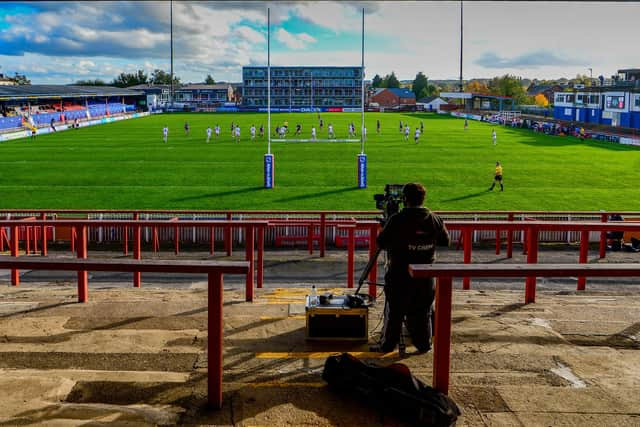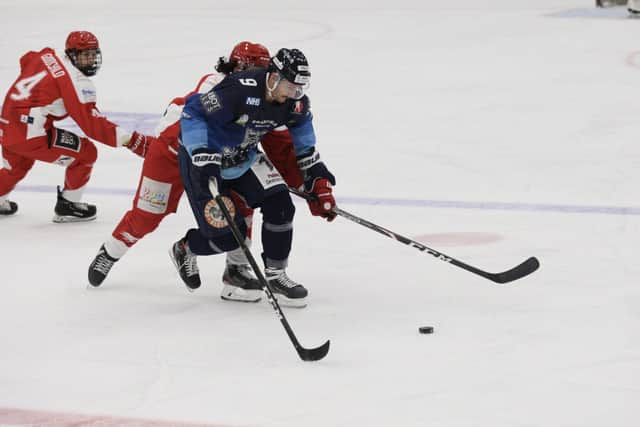How Barnsley FC, Bradford Bulls, Doncaster Knights and cross-section of sports are dealing with Covid-enforced lockout of fans


Football
The national pastime is a sport divided. Fans can watch football at clubs in Tier 1 and Tier 2, but the majority of Yorkshire is in Tier 3, meaning the lockout that began in March, continues.
Premier League and Championship football returned in June, while the National League, non-league and Women’s Superleague was subject of a recent Government bailout. But clubs in Leagues One and Two, like Doncaster Rovers and Bradford City, have been left on their own.


Advertisement
Hide AdAdvertisement
Hide AdTaking Barnsley Football Club as a test case, their Coronavirus bill – in terms of lost revenue from the absence of fans and the money they have spent on testing and Covid-protection measures – runs into seven figures.
While loath to put an exact figure on it, Reds chief executive officer Dane Murphy admits it is ‘not pretty.’
As for the issue of an emergency rescue package following the devastating effects of Covid-19 across the EFL, Murphy is sceptical.
He said: “Our situation remains dififcult. We have made steps in every department in terms of decision-making to make sure we are financially viable.


Advertisement
Hide AdAdvertisement
Hide Ad“But if people are continuing to rely on the bail-out coming from the Government, Premier League or FA, it is not going to come in my estimation.
“There have been a ton of sacrifices since this started. Barnsley finds itself in a place where it can shed water and continue to stay afloat. Others are not so lucky. At some point soon, it may break (some clubs).”
On the prospects of a bailout, he admitted: “If I was a betting man in the short-term, I do not see it.
“The problem is there’s too many people voicing what should be done and their ideas. A lot gets muddied because there’s not one room with four or five people in it doing what needs to happen and what the plan is.


Advertisement
Hide AdAdvertisement
Hide Ad“You can hold as many conferences and cabinet meetings as you want. But you are just going to argue around in circles, if you have not figured it out by now. I am not saying it’s easy. But it does not seem there’s momentum to actually get something done.”
Rugby league
Super League has been well looked after with bailouts of £16m and £12m. And now there is finally “light at the end of the tunnel” for rugby league clubs outside of Super League.
For Mark Sawyer – Bradford Bulls chief executive and Dewsbury Rams chairman – the news that fans can return in areas with Tier 2 restrictions has come as a huge boost.
A Government loan has been made available to all rugby league clubs but neither the Rams nor the Bulldogs have had to draw on any of that money, yet.
Advertisement
Hide AdAdvertisement
Hide AdWest Yorkshire is currently in Tier 3 measures, meaning supporters are not permitted to attend sporting events.
There is plenty of time before the start of next season, however, for the area to get the spread of Covid-19 under control.
Up to 2,000 fans can attend in Tier 2 areas, although with social distancing in place it is likely Dewsbury could only fit 1,500 supporters into the Tetley’s Stadium.
The Bulls are hopeful of returning to Odsal next season, although redevelopment work is required which could see fans kept out until April.
Advertisement
Hide AdAdvertisement
Hide Ad“We have got by and we are not in a bad position at either club from a financial point of view,” said Sawyer. “We are just desperate for a return to play.
“It is going to be 12 months since we last played by the time we return. I think people are really missing it.”
He added: “It would be a great achievement if we could get from Tier 3 to Tier 2 by next year.
“There is certainly a light at the end of the tunnel and it has given us all a lift.”
Advertisement
Hide AdAdvertisement
Hide AdMeanwhile, the generosity and commitment of Featherstone Rovers’ supporters has been vital to getting the club through a challenging year. Unbeaten in league and cup in 2020 prior to lockdown, Featherstone hope to be playing Super League rugby next season as one of six clubs bidding to be the 12th club.
Featherstone chief executive Davide Longo confirmed that 95 per cent of fans with a season card did not request a refund.
Rovers feel confident they could safely welcome 2,500 fans back into their stadium if restrictions allow.
He said: “We have got a stadium that is probably one of the easier ones to social distance in. We have got the four stands and a lot of seats. I would be confident we could get a large number of our committed fans into the stadium.
Advertisement
Hide AdAdvertisement
Hide Ad“I have done the maths and we could get around 2,000 to 2,500 fans in the stadium and that is pretty much our average. We would be very happy with that.”
Rugby union
Doncaster Knights, who operate in the Championship, are the county’s highest-ranked rugby union club.
They are well-supported financially by executive chairman Tony De Mulder and chairman Steve Lloyd, and – with their Castle Park ground offering a range of other facilities – are confident they will emerge from the crisis in a positive state. That said, it is not easy.
De Mulder said: “This £9m the Government has given to the Championship, we’re not sure yet just what format it will take. We think it is mainly loans rather than a grant.
Advertisement
Hide AdAdvertisement
Hide Ad“When that figure came out last week everybody said we’d be okay as we’d get £750,000 per club, but that’s not true.
“We were hoping to be in Tier 2 which would allow us the crowds back in at Castle Park; we’d be allowed about 2,000 spectators if we got that in South Yorkshire. But we’re in Tier 3 so we are looking at streaming games so if we get playing again, we’ve already set in motion a streaming system.”
Like everyone, Doncaster have been doing what they can to bring in much-needed revenue.
De Mulder added: “Our famous Cow Pie has gone down a treat. We’ve been selling that and doing takeaway Sunday lunches which all helps but it’s only a bit. It’s only pocket money really.
Advertisement
Hide AdAdvertisement
Hide Ad“The big sticking point for us at the moment is the costs of Covid testing and whether the Government or the RFU will support it.
“It’s £85 per player. We do it once a week and have about 40 players and staff so that’s around £4,000 per week.”
Rugby union at the very elite level got going again in September, but there has been nothing at level two or below since March.
Aquatics
Swimming pools, and the leisure sector, was one of the hardest hit. Back in July, Jane Nickerson, the chief executive of SwimEngland told The Yorkshire Post she feared 40 per cent of pools might never re-open after the first lockdown, a warning that almost came home to roost when the world famous Ponds Forge was mothballed.
Advertisement
Hide AdAdvertisement
Hide AdThe overturning of that decision saw the tide start to turn and in the Chancellor’s spending review on Thursday, swimming pools were included in the £4bn investment in community facilities.
Nickerson said: “Not only is investing in aquatic facilities the right thing to do from a health point of view, the economic benefits mean it is an efficient use of public money.
“Investing in swimming will help local economies, support the NHS and improve the nation’s physical and mental health in every corner of the country.”
Snooker
One sport that has thrived during the coronavirus pandemic is snooker.
Advertisement
Hide AdAdvertisement
Hide AdThe boys were back on the baize on June 1, sport’s first day back after lockdown, and the governing body has managed to hold all their major events, and get socially-distanced fans into the Crucible for the first and last days of the world championship.
A World Snooker Tour spokesman said: “We have kept our tour going with behind-closed-doors events and in fact we will stage a total of 20 tournaments in 2020.”
“But to be able to welcome fans back into arenas will give our sport a huge boost.”
Having said that, performing without fans has not been easy for the players, as Yorkshire’s David Grace says. “We’ve missed the fans for a while and it is tough without them.
“Performing in front of fans is why you play the game.”
Ice hockey
Advertisement
Hide AdAdvertisement
Hide AdThe top-flight Elite League effectively cancelled its 2020-21 season back in September, making it clear that, without fans in rinks, there is no way they could stage a campaign while also making it a financially viable proposition.
Last week, as part of its £340m bailout package for spectator sports, the DCMS revealed there was potential for the EIHL to apply for up to £4m of funding, although it has not been confirmed yet whether this would be in the form of a grant or loans.
One major sticking point, however, is that the funding will only be available for half of the 10 clubs – those based in England. Belfast Giants, Cardiff Devils, Fife Flyers, Dundee Stars and Glasgow Clan will have to try and source funding through their respective devolved administrations.
As it is, however, the EIHL revealed on Friday afternoon that, following further talks with Sport England – who will allocate the £4m bailout if clubs opt to apply for it – they are looking at possibly starting some kind of season as early as January – most likely behind closed doors initially, although it depends in which tier teams are in at the time.
Advertisement
Hide AdAdvertisement
Hide AdBelow the EIHL, the EIHA, which governs the game in England from the NIHL National League down to the grassroots, was offered nothing in the so-called bailout.
Three second-tier teams, including Sheffield Steeldogs, have forged ahead with a behind-closed-doors tournament with games being streamed online for fans. But it remains to be seen whether the experiment can be expanded to include other NIHL National teams and, with that, some sort of meaningful league season.
Support The Yorkshire Post and become a subscriber today. Your subscription will help us to continue to bring quality news to the people of Yorkshire. In return, you’ll see fewer ads on site, get free access to our app and receive exclusive members-only offers. Click HERE to subscribe.
Comment Guidelines
National World encourages reader discussion on our stories. User feedback, insights and back-and-forth exchanges add a rich layer of context to reporting. Please review our Community Guidelines before commenting.